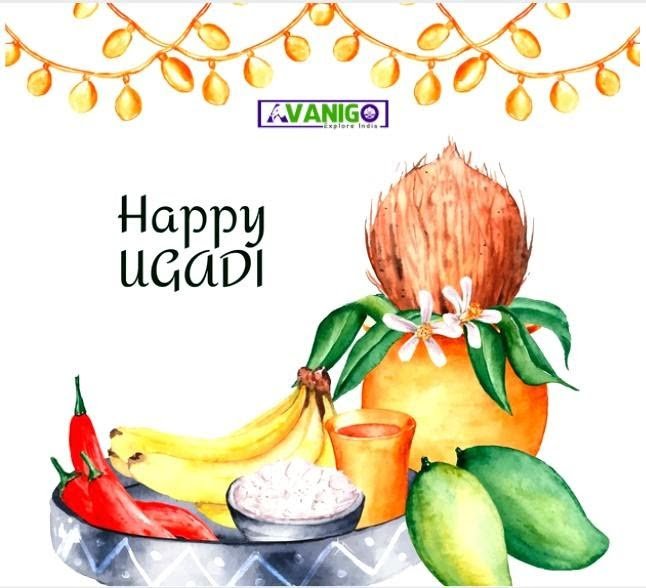If there is one festival that Telugus and Kannadigas do not miss celebrating, it is Ugadi. Considered one of the significant festivals that reflects their culture, Ugadi has much astronomical and scientific reason behind it.
This post decodes the scientific reason behind the celebration of Ugadi and what each Ugadi practice implies. We will also see the story behind Ugadi, the importance of Panchangam and Ugadi 2023 wishes.
Quick Navigation
Ugadi Story
Ugadi marks the beginning of the New Year for the Telugu and Kannadigas. There are people from other states of India who also celebrate Ugadi as the mark of New year.
The name Ugadi originates from the Sanskrit word “Yugadi” which means “Yuga+Adi”. It translates to “Mark of New Year” in English. But why do we celebrate Ugadi as New year? There is an interesting story behind the Ugadi celebration.
In the Satya yuga (during the early years of the formation of Earth), there was a powerful demon named Somakasura. He stole the Vedas from Lord Brahma and hid deep inside the oceans.
Then Lord Brahma sought the help of Lord Vishnu in gaining back the Vedas. Then Lord Sri Maha Vishnu donned the incarnation of the Divine Fish (Matsyavatara). He killed Somakasura, brought back the Vedas, and handed them to Brahma.

Then Brahma started creating the Universe again. This day is nothing but Ugadi.
Interestingly, Ugadi does not imply the start of any Yugas as per Hinduism. The meaning of Ugadi is the first day of Yuga, as per Brahma. For Lord Brahma, one Kalpa (4.32 billion years) for humans is equal to one day for Brahma. Every year on this day of Ugadi Lord Brahma writes new fates for humanity. This is the meaning behind Ugadi. This means every new year as per the Hindu calendar brings on new challenges, happiness, and its taste into everyone’s life.
The Hindu calendar has 60 years in total. Every year has its name, and Ugadi marks the beginning of every new year. Once all the 60 years are completed in sequence, then the first year appears again and the cycle continues.
The names of Telugu Years are as given here:
| Count of Telugu Year | Telugu Year Name (English) | Telugu Year Name (Telugu) | Last Occurred | Next Occurrence |
| 1 | Prabhava | ప్రభవ | 1987 | 2047 |
| 2 | Vibhava | విభవ | 1988 | 2048 |
| 3 | Sukla | శుక్ల | 1989 | 2049 |
| 4 | Pramodyuta | ప్రమోద్యూత | 1990 | 2050 |
| 5 | Prajothpatti | ప్రజోత్పత్తి | 1991 | 2051 |
| 6 | Aangeerasa | ఆంగీరస | 1992 | 2052 |
| 7 | Sreemukha | శ్రీముఖ | 1993 | 2053 |
| 8 | Bhaava | భావ | 1994 | 2054 |
| 9 | Yuva | యువ | 1995 | 2055 |
| 10 | Dhaata | ధాత | 1996 | 2056 |
| 11 | Eeswara | ఈశ్వర | 1997 | 2057 |
| 12 | Bahudhaanya | బహుధాన్య | 1998 | 2058 |
| 13 | Pramaadhi | ప్రమాధి | 1999 | 2059 |
| 14 | Vikrama | విక్రమ | 1940 | 2000 |
| 15 | Vrisha | వృష | 1941 | 2001 |
| 16 | Chitrabhaanu | చిత్రభాను | 1942 | 2002 |
| 17 | Svabhaanu | స్వభాను | 1943 | 2003 |
| 18 | Taarana | తారణ | 1944 | 2004 |
| 19 | Paarthiva | పార్థివ | 1945 | 2005 |
| 20 | Vyaya | వ్యయ | 1946 | 2006 |
| 21 | Sarvajithu | సర్వజిత్తు | 1947 | 2007 |
| 22 | Sarvadhaari | సర్వధారి | 1948 | 2008 |
| 23 | Virodhi | విరోధి | 1949 | 2009 |
| 24 | Vikruti | వికృతి | 1950 | 2010 |
| 25 | Khara | ఖర | 1951 | 2011 |
| 26 | Nandana | నందన | 1952 | 2012 |
| 27 | Vijaya | విజయ | 1953 | 2013 |
| 28 | Jaya | జయ | 1954 | 2014 |
| 29 | Manmadha | మన్మధ | 1955 | 2015 |
| 30 | Durmukhi | దుర్ముఖి | 1956 | 2016 |
| 31 | Hevalambi | హేవళంబి | 1957 | 2017 |
| 32 | Vilambi | విళంబి | 1958 | 2018 |
| 33 | Vikaari | వికారి | 1959 | 2019 |
| 34 | Saarvari | శార్వరి | 1960 | 2020 |
| 35 | Plava | ప్లవ | 1961 | 2021 |
| 36 | Subhakritu | శుభకృతు | 1962 | 2022 |
| 37 | Sobhakritu | శోభకృతు | 1963 | 2023 |
| 38 | Krodhi | క్రోధి | 1964 | 2024 |
| 39 | Viswaavasu | విశ్వావసు | 1965 | 2025 |
| 40 | Paraabhava | పరాభవ (vu) | 1966 | 2026 |
| 41 | Plavanga | ప్లవంగ | 1967 | 2027 |
| 42 | Keelaka | కీలక | 1968 | 2028 |
| 43 | Soumya | సౌమ్య | 1969 | 2029 |
| 44 | Saadhaarana | సాధారణ | 1970 | 2030 |
| 45 | Virodhikritu | విరోధికృతు | 1971 | 2031 |
| 46 | Paridhaavi | పరిధావి | 1972 | 2032 |
| 47 | Pramaadeecha | ప్రమాదీచ | 1973 | 2033 |
| 48 | Aananda | ఆనంద | 1974 | 2034 |
| 49 | Raakshasa | రాక్షస | 1975 | 2035 |
| 50 | Nala | నల | 1976 | 2036 |
| 51 | Pingala | పింగళ | 1977 | 2037 |
| 52 | Kaalayukti | కాళయుక్తి | 1978 | 2038 |
| 53 | Siddhaarthi | సిద్ధార్ది | 1979 | 2039 |
| 54 | Roudri | రౌద్రి | 1980 | 2040 |
| 55 | Durmathi | దుర్మతి | 1981 | 2041 |
| 56 | Dundubhi | దుందుభి | 1982 | 2042 |
| 57 | Rudhirodgaari | రుధిరోద్గారి | 1983 | 2043 |
| 58 | Raktaakshi | రక్తాక్షి | 1984 | 2044 |
| 59 | Krodhana | క్రోధన | 1985 | 2045 |
| 60 | Akshya | అక్షయ | 1986 | 2046 |
- The Telugu year name 2021 as per Panchangam is Plava. (ప్లవ)
- The Telugu year name 2022 as per Panchangam is Shubhakruthu. (శుభకృతు)
- The Telugu year name 2023 as per Panchangam is Shobhakruthu. (శోభకృతు)
Scientific Reason behind Ugadi
Like any other Indian festival that falls as per the Lunisolar (chandramana-souramana) calendar, Ugadi also has immense science behind it.
Ugadi (Chaitra Suddha Padyami) is the first day of Chaitra (first month of the year as per the Telugu calendar. The day before Ugadi is New Moon day (Amavasya). Padyami is the first day in the fifteen days of a month that is in tune with the moon’s transition.
It is on this day, the tilting of Earth is such that it starts receiving the maximum solar energy. In other words, it is from this day that new energy starts entering into every living organism on the Earth, especially in the Northern Hemisphere. This impact lasts for 21 days beginning the day of Ugadi. Thus, it is true that Ugadi is a new beginning for the whole of the Northern Hemisphere.
Ugadi marks the beginning of Summer in India. The trees start blooming, especially the National fruit of India Mango starts giving its freshest flowers and fruits. Neem trees, too, blossom and the leaves emit their powerful mesmerising scent. Nightingales start cooing and the whole atmosphere turns pleasant on this day.
Though the summer begins from this day and the scorching heat follows, Ugadi holds immense geographical, astrological, and health secrets behind its celebration. The Ugadi practices are designed accordingly.
Chaitra month in fact a prominent with each day holding its significance. People worship Goddess RajaRajeshwari for the nine days in Chaitra month, which is known as Chaitra masa puja. Another festival Sri Rama Navami also falls in Chaitra month, on the ninth day (Chaitra Suddha Navami).
Ugadi Practices
Ugadi festival comes with its own celebrations and practices. Houses adorn fresh life; people deep clean their houses and throw away unused and broken items. Houses are cleaned with water, house fronts are decorated with colorful rangolis to welcome the new year.
Mango leaves along with marigold flowers are tied at the entrance and turmeric and Kumkum are applied to the main entrance. People start new tasks on this day with a belief that it will bring in immense luck and all success.
The main rituals every Hindu does on this day are Taking Abhyanga, Prayer to Sun God, Eating Ugadi Pachadi, and Listening to Panchangam.
Taking Abhyanga on Ugadi
Ugadi begins the summer season. Thus, to cool the body, ancient sages devised the ritual of Abhyanga. According to this, one should massage their head and body with Castor oil deep into the skin, retain it for some time and then take a head bath with herb extracts. This prepares the body for the summer heat and helps cool it from deep within.
Some people also believe in seeing their reflection in the molten ghee as a mark of a new beginning on this day.
Worshipping Sun God
After the bath, people wear new clothes and worship Sun God and Lord Vishnu along with their ilavelpu (God of the House as per traditions). They pray for health, happiness, and prosperity in the upcoming year. They offer to God – Ugadi Pachadi, the special recipe made on the eve of Ugadi.
Significance of Ugadi Pachadi
Ugadi pachadi is made from ingredients that impart 6 tastes – spice (Karam), sweet (teepi), salt (uppu), sour (vagaru), bitter (chedu), sour (pulupu).
The only detox food you should not miss this season is Ugadi Pacchadi. It drives away any infections from the body and prepares it for the summer heat. As per Shastras, one must consume Ugadi Pacchadi for the 21 days that follow Ugadi. It imparts them enough stamina and immunity and keeps them healthy for the coming year.
The ingredients of Ugadi pachadi are – raw mango, new jaggery, new tamarind, water, chili powder, neem flowers, and salt.
How to make Ugadi Pachadi?
- After taking the head bath as mentioned above, the women of the house soak new tamarins in enough water. After some time, the tamarind is squeezed and pulp is thrown out and water with tamarind flavor is filtered.
- To this, chopped raw mango, enough salt, crushed new jaggery, cleaned neem flowers, and enough chili powder is added and mixed thoroughly.
- It is then offered to God and then consumed by everyone in the family. It is also distributed to the near and dear and relatives who visit the house on this festival day.
- Some people also add pepper powder instead of chili powder, banana, fried gram, and or sugar too based on their practices.
Each taste corresponds to each feeling in life. It is believed that the taste which our tongue experiences first on consuming the Ugadi pachadi reveals how the upcoming year is going to be.

The science behind Ugadi Pachadi
Ugadi pachadi is made such that it drives away the infection from the body and prepares the body for the coming season. As per Shastras, one has to consume Ugadi Pachadi for the whole 21 days that follow Ugadi. This will give them enough stamina and immunity and keeps them healthy for the whole coming year.
According to Ayurveda, neem kills the viruses inside the body and jaggery helps in boosting blood cell production. Thus, Ugadi pachadi makes one immune and healthy.
There is a special sloka that one has to recite while consuming Ugadi Pachadi:
| |Shatayu Vajra Dehaya. Sarva Sampath
Karayacha. Sarva Rishta Vinashaya. I
Nimbakam Dala Bhakshanam| |
Meaning – “Oh God, please give me a body strong like diamond and disease-free. Let the whole world be free from bad things like I consume these neem flowers in a gulp.”
Panchanga Sravanam
Another important Ugadi practice is Panchanga Sravanam. This is an event where priests and scholars read out the astrological results of the people belonging to different moon signs in the upcoming year. This includes predictions related to health, income, expenses, family, career, education, politics, nation, and the overall world!
People visit temples to take darshan of their deity and listen to Panchangam. Some people also invite priests to apartments and colonies in the evening for Puja and Panchanga Shravanam.
Significance of Panchangam
Panchanga Sravanam means listening to astrological explanation of the five Angas (parts) of the time.
According to the Hindu calendar, Time has five parts –Tithi, Vara, Nakshatra, Yoga, and Karanam.
- Tithi: This represents the time distance between Earth and the Moon. The first day after the New Moon is called Paadyami (the time distance of one day), the second day is called Vidiya (time distance of two days), and so on.
- Vara: The day of the week. Each week has seven days that represent the one hour Hora after the sunrise every day. If the Hora is of the planet Mangala (Venus), the day is Mangala vara (Tuesday).
- Nakshatra: This means star of the day. There are 27 stars as per Panchanga. That star that aligns with the moon determines the nakshatra of the day.
- Yoga: These are also similar to Nakshatras.
- Karanam: These are a part of this and some are good while some are considered bad.
The main reason why Panchangam is devised is that it helps us to determine the auspicious moment that will give us fruitful results if we start any new task at that time.
The hidden meaning in Panchangam and Telugu calendar is that human effort should be supported by the effort of Nature for better benefits. This logic is scientifically backed by the fact that the human mind changes under the waxing and waning of the moon.
Names of Ugadi in the Different States of India
People in various states of India celebrate Ugadi with different names as below:
| State | Ugadi Name |
| Andhra Pradesh and Telangana | Ugadi |
| Karnataka | Yugadi |
| Tamilnadu | Puthandu (Date is one 14th April) |
| Maharashtra | Gudi Padwa |
| Sindhis | Cheti Chand |
| Manipur | Sajibu Nongma Panba |
| Hindus in Bali and Indonesia | Nyepi |
Related: Puthandu wishes in Tamil
Ugadi Recipes
Along with Ugadi Pachadi, various Ugadi recipes are prepared on this day depending on the local culture and practices:
- Poornam Boorelu – made in Telugu states, comprising a mix of jaggery and boiled chana dal coated with dosa batter and deep-fried and served with dollops of ghee.
- Bellam Pongali: Made with new rice, new jaggery, and ghee.
- Atukula laddu (Poha laddu) – laddoos made of poha, ghee, and jaggery.
- Rawa Kesari – sooji Kesari made with sugar syrup and served with a seasoning of Kaju and kismis.
- Pulihora (tamarind rice): Spicy rice variety made with tamarind extract.
- Mango pulihora: Another variant of pulihora made with grated raw mango.
- Nuvvula laddu (Sesame ladoo): Laddos made of sesame and jaggery.
- Bobbatlu: Also called Puran poli, made with wheat flour/maida and jaggery and chana dal mix.
- Murukulu: Crispy fried snacks made with rice flour.
- Gaarelu: Made with urad dal and served with ginger chutney.
Ugadi 2023 Wishes in English
- May this Ugadi fill in all the happiness in your lives like the sweetness of Jaggery in the Ugadi Pachadi. Happy Ugadi to you!
- Ugadi is the moment to welcome new energy and hopes! Let this Ugadi bring along all prosperity to you and your family.
- Ugadi is the season when flowers bloom and birds sing! Kick away all the sadness and let new hopes bloom in your life. Happy Ugadi.
- May this New Year be impartial to you and give all the aspects of life in equal parts. Happy Ugadi to you!

Ugadi Wishes in Telugu
- ఈ ఉగాది ఉగాది పచ్చడిలోని బెల్లం యొక్క మాధుర్యం వంటి మీ జీవితంలోని అన్ని ఆనందాలను నింపండి. మీకు ఉగాది శుభాకాంక్షలు!
- ఉగాది కొత్త శక్తిని, ఆశలను స్వాగతించే సమయం! ఈ ఉగాది మీకు మరియు మీ కుటుంబానికి అన్ని శ్రేయస్సును తెస్తుంది.
- ఉగాది అంటే పువ్వులు వికసి పక్షులు పాడే సమయం! అన్ని బాధలను తొలగించి, మీ జీవితంలో కొత్త ఆశలు వికసించనివ్వండి. హ్యాపీ ఉగాది.
- ఈ నూతన సంవత్సరం మీకు నిష్పాక్షికంగా ఉండి, జీవితంలోని అన్ని అంశాలను సమాన భాగాలుగా ఇవ్వండి. మీకు ఉగాది శుభాకాంక్షలు!
Ugadi wishes in Kannada
- ಈ ಉಗಾಡಿ ನಿಮ್ಮ ಜೀವನದ ಎಲ್ಲಾ ಸಂತೋಷವನ್ನು ಉಗಾಡಿ ಪಚಾದಿಯಲ್ಲಿ ಬೆಲ್ಲದ ಮಾಧುರ್ಯದಂತೆ ತುಂಬಲಿ. ನಿಮಗೆ ಉಗಾಡಿ ಶುಭಾಶಯಗಳು!
- ಉಗಾಡಿ ಹೊಸ ಶಕ್ತಿ ಮತ್ತು ಭರವಸೆಗಳನ್ನು ಸ್ವಾಗತಿಸುವ ಸಮಯ! ಈ ಉಗಾಡಿ ನಿಮಗೆ ಮತ್ತು ನಿಮ್ಮ ಕುಟುಂಬಕ್ಕೆ ಎಲ್ಲಾ ಸಮೃದ್ಧಿಯನ್ನು ತರಲಿ.
- ಉಗಾಡಿ ಎಂದರೆ ಹೂವುಗಳು ಅರಳುತ್ತವೆ ಮತ್ತು ಪಕ್ಷಿಗಳು ಹಾಡುವ ಸಮಯ! ಎಲ್ಲಾ ದುಃಖವನ್ನು ದೂರ ಮಾಡಿ ಮತ್ತು ನಿಮ್ಮ ಜೀವನದಲ್ಲಿ ಹೊಸ ಭರವಸೆಗಳು ಅರಳಲು ಬಿಡಿ. ಹ್ಯಾಪಿ ಉಗಾಡಿ.
- ಈ ಹೊಸ ವರ್ಷವು ನಿಮಗೆ ನಿಷ್ಪಕ್ಷಪಾತವಾಗಲಿ ಮತ್ತು ಜೀವನದ ಎಲ್ಲಾ ಅಂಶಗಳನ್ನು ಸಮಾನ ಭಾಗಗಳಲ್ಲಿ ನೀಡಲಿ. ನಿಮಗೆ ಉಗಾಡಿ ಶುಭಾಶಯಗಳು!
Conclusion
Ugadi 2023 is the actual New Year that Indians should celebrate. It has so many science and health secrets hidden in it. All respect to ancient Indian sages who calculated time and its parts and predicted everything in the calendar without even a single mistake of a second.
Ugadi is the time to feel proud of our own culture and celebrate it according to the mentioned procedure. Happy Ugadi 2023to you all! Shobhakritu naama Samvatsara Subhakanskhalu.

